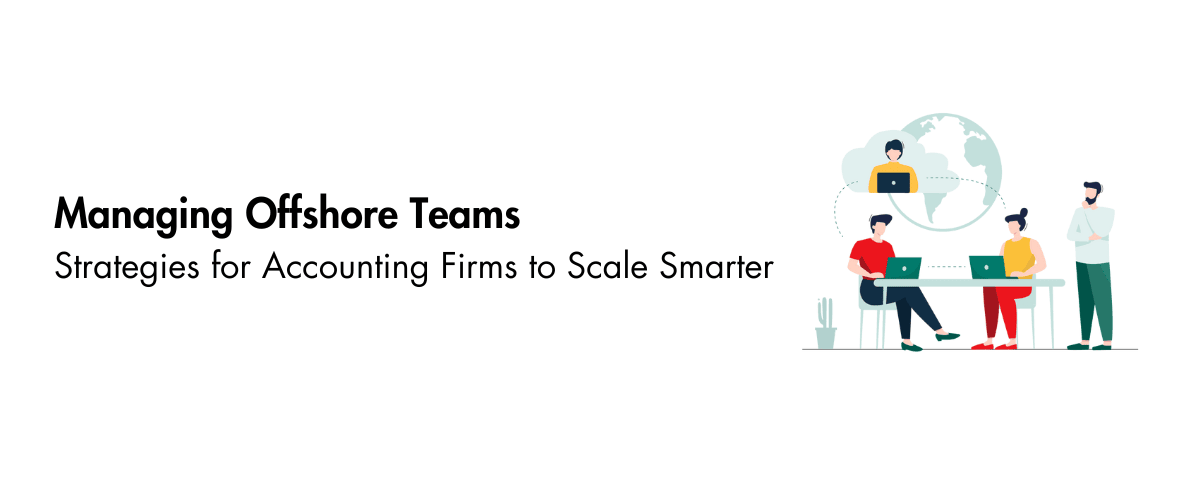Accountably partners with CPA firms, Enrolled Agents, and accounting practices to provide offshore staff and white label back office support that follows U.S. compliance standards, IRS rules, and GAAP. We will use that lens so you can manage an offshore accounting team with confidence, protect client data, and get your nights back.
Table of Contents
- Key Takeaways
- What Offshoring Means, and How It Differs From Onshore and Nearshore
- Why Offshore Teams Work For CPA, EA, and CAS Practices
- Common Challenges, Solved Upfront
- Establish Clear Rules, Roles, and Processes
- Document Workflows So Handoffs Are Frictionless
- Set Communication Protocols That Remove Guesswork
- Make Time Zones Work With Async First Habits
- Communication, Feedback, and Documentation Best Practices
- Quality Assurance, Risk Mitigation, and Tooling Essentials
- Security, Compliance, and Data Protection You Can Defend
- Sample SLAs and Operating Metrics
- Frequently Asked Questions
- Conclusion
Key Takeaways
- Set explicit ownership and a cooperation constitution that defines decision rights, SLAs, escalation paths, and who signs off at each review step.
- Work async first, use tools that support clean handoffs, for example Karbon or Canopy for work, Slack or Teams for threads, Loom for walkthroughs, and schedule 3 to 4 hours of daily overlap to clear blockers the same day.
- Standardize tickets and tasks with acceptance criteria, sample workpapers, test data or trial balance, and a review checklist to reduce rework.
- Enforce quality gates, peer review, and audit trails, for example reviewer sign offs, checklist completion, tie outs, and automated validations, so accuracy stays high as volume grows.
- Keep versioned documentation in your source of truth, measure lead time and idle queues, and reassign owners quickly to remove bottlenecks.
What Offshoring Means, and How It Differs From Onshore and Nearshore
Offshoring is the practice of building a team in a different country to extend capacity, reduce cost, and add predictable coverage. Onshore keeps everyone in your country. Nearshore sits in closer time zones. Offshore gives you the biggest cost advantage, and it asks you to be sharper with documentation, security, and communication. When you invest in process, you get round the clock progress, lower fully loaded cost per file, and the ability to ramp for busy season without over hiring locally.
You are trading distance for process. Strong playbooks turn time zone gaps into overnight progress.
Why Offshore Teams Work For CPA, EA, and CAS Practices
Cost efficiency that funds better client service
You can often shift 30 to 60 percent of labor cost per task, then re invest those savings into reviews, analytics, client education, and tools. Instead of cutting corners in March, you fund a second review on complex returns, or a better month end close for your top clients.
Cycle time improvements with handoffs
Time zones become a force multiplier when you design the day. Your onshore team clarifies priorities and answers questions during the overlap. Your offshore team processes and prepares while you sleep. Morning reviews move files forward. That rhythm leads to shorter queues and fewer last minute scrambles.
Scalable capacity during peaks
Hiring, screening, and training take time you often do not have in January or August. Offshore partners can stand up trained pods in weeks, not months. That capacity means you can say yes to more work without overloading your core team.
Access to specialized skills
You can tap experienced staff for bookkeeping, AR and AP, payroll, sales tax filings, month end close, and tax prep across 1040, 1065, 1120, and 1120S. For assurance support, you can add hands for workpapers, tie outs, and sampling under your supervision. You keep control and review, your offshore pod provides throughput.
Common Challenges, Solved Upfront
Offshore work multiplies both leverage and risk. You reduce the risk with clear rules and repeatable habits.
- Time zones, plan 3 to 4 hours of overlap or two short bookend touch points so blockers do not sit overnight.
- Communication, ask for requirement read backs, follow with a written summary, and attach a visual example, for instance a sample trial balance, a template PBC list, or a marked up return.
- Quality, define acceptance criteria, enforce peer review and sign offs, and tie payment milestones to measurable outputs.
- Cultural fit, teach context, invite opinions early, and build psychological safety so people raise a hand when they are unsure.
- Operational risk, diversify locations if you can, keep a contingency playbook, and ensure data replication and access continuity.
Establish Clear Rules, Roles, and Processes
You will move faster and reduce defects when every file has a named owner, a reviewer, and clear success criteria.
Define roles and ownership with a RACI
Map RACI for each deliverable. In a CAS workflow, the Client Manager is accountable, the Senior Accountant is responsible, the Reviewer is consulted, and the Client or Partner is informed. In tax, the Preparer is responsible, the Reviewer is accountable, the Partner is consulted for positions, and the Client is informed at milestones. Name primary and backup owners, include response SLAs, for example 4 hours during overlap, 24 hours otherwise, and list approvers for release steps like e file.
- Add RACI and owners in your work management tool, for example Karbon, Canopy, or Jetpack Workflow.
- Enforce task templates that include purpose, acceptance criteria, review checklist, test data or TB, and delivery artifacts.
- Run a weekly ownership review that lists actions, owners, due dates, and stuck items.
- Reassign fast when queues grow, and follow your escalation path from Senior to Manager to Partner.
Document Workflows So Handoffs Are Frictionless
Write a cooperation constitution that sets roles, decision rights, response windows, and escalation paths. Then turn recurring work into standard operating procedures. Good SOPs show the why, the steps, the owner, the inputs, the outputs, and done criteria. Store SOPs in a versioned source of truth, for example Confluence, Notion, or your practice’s knowledge base, with change logs and named owners.
- Onboarding, access requests, MFA setup, security training, and tool walkthroughs.
- Bookkeeping, monthly close, reconciliations, JE templates, and variance analysis.
- Tax prep, PBC lists by return type, source document indexing, workpaper standards, and reviewer notes handling.
- Payroll and sales tax, calendars, cutoffs, state specific rules, and filing confirmations.
- Incident response, late client data, missing access, unexpected variances, and how to escalate.
| H4: Friction | H4: Outcome |
| Ambiguity | Faster cycle times |
| Rework | Higher first pass accuracy |
| Hidden ownership | Clear accountability |
| Tribal knowledge | Repeatable excellence |
| Surprise escalations | Controlled risk |
Set Communication Protocols That Remove Guesswork
Start with a written cooperation constitution that names primary contacts, lists response SLAs, sets meeting cadence, and maps escalation. You are designing speed into the system.
- Lock overlapping core hours, 3 to 4 hours works well. Use two bookend touch points, one at your morning to set priorities, one late afternoon to clear blockers. This keeps questions from rolling a full day.
- Standardize tools, Karbon or Canopy for work and tasks, Slack or Teams for threads, Loom for walkthroughs. Enforce templates for requirements, review checklists, and sign offs.
- Publish RACI by role, Client Manager, Reviewer, Senior Accountant, Tax Preparer, QA, and revisit decision rights each sprint or month.
- Require multi format requirements, a quick verbal brief with read back, a written summary in the task, and a visual example such as a filled template or annotated PDF.
Make Time Zones Work With Async First Habits
Async first does not mean never meeting, it means handoffs are so clear that work moves forward without waiting.
- Guarantee 2 to 4 hours of daily overlap for standups and unblockers.
- Write unambiguous tickets, include acceptance criteria, sample documents, and an expected output example.
- Use Loom to show a workflow once, then keep the link in the task.
- Route reviews and approvals to onshore daytime so your offshore team starts with answers.
- Track response SLAs, for example priority items get a reply within 4 hours on weekdays.
The question to ask is not who has it, it is what is the next clear action, by whom, and by when.
Communication, Feedback, and Documentation Best Practices
As you scale, clarity beats volume. Design signals that are precise and measurable.
- Communicate the work three times. Confirm requirements verbally and ask the team to restate them, write a summary in the task with bullet points, attach a visual, for example a sample TB, checklist, or screenshot.
- Bookend the offshore day. A short morning alignment sets priorities, a quick afternoon touchpoint clears blockers so questions do not drift overnight.
- Enforce concise ticket templates. A strong template includes title, goal, acceptance criteria, test data, screenshots or sample outputs, and review steps. Teams that standardize templates cut clarification time noticeably.
- Give objective, data backed feedback. Cite task IDs, timestamps, review notes count, and test results. Track response times so SLAs are visible and respected.
- Keep versioned documentation and make updates part of Definition of Done. If a step changed, the SOP must be updated before the task closes.
Quality Assurance, Risk Mitigation, and Tooling Essentials
Speed only works when quality keeps up. Treat quality as a set of gates, not a vibe.
- Peer review, every file has a reviewer who signs off. Use structured checklists for bookkeeping and returns so reviews are consistent.
- Automated validations where possible, for example trial balance tie outs, bank feed matching rules, and e file diagnostics before submission.
- Documentation standards, clear workpapers, indexed source docs, and reviewer notes resolved in the system, not in DMs.
- Metrics, measure first pass accuracy, review notes per file, and time to clear notes. Target steady improvement over the quarter.
| H4: Pillar | H4: Practice | H4: Outcome |
| Quality | Peer review plus checklists | Fewer review notes, cleaner files |
| Delivery | Task gates plus clear templates | Faster fixes and fewer handbacks |
| Resilience | Playbooks for incidents | Shorter time to detect and recover |
For firms that need a ready made structure, Accountably builds pods that plug into your processes, follow your checklists, and maintain audit trails you can trust, all aligned with U.S. standards.
Security, Compliance, and Data Protection You Can Defend
In accounting and tax, trust is the product. Write a simple, strong security baseline and make it visible.
- Access control, least privilege and role based access, no shared logins, mandatory MFA, and quarterly access reviews.
- Data handling, use secure portals like SmartVault or ShareFile, no email attachments with PII, client data stays in approved systems.
- Compliance alignment, follow IRS Publication 4557 safeguards, maintain a Written Information Security Plan, respect GAAP in financial prep, and document your review procedures. If you serve regulated clients, align with SOC 2 controls where possible.
- Device standards, encrypted laptops, screen lock, patching, and endpoint protection.
- Training, quarterly refreshers on phishing, PII, and secure document handling, include short quizzes so knowledge sticks.
- Business continuity, define backup vendors, mirrored processes, and data replication so work continues during local outages.
Accountably’s model aligns with U.S. compliance standards, IRS regulations, and GAAP. Dedicated teams integrate with your tools and follow your WISP, so you scale without adding risk or sleepless nights.
Sample SLAs and Operating Metrics
A few example SLAs that work well for offshore accounting pods. Tweak to fit your service lines and client promises.
| H4: Process | H4: SLA Target | H4: Acceptance Criteria |
| Bookkeeping, monthly close | Books closed within 5 business days of month end | All accounts reconciled, variances explained, MRR and cash flow updated, reviewer sign off complete |
| AP processing | Invoices entered within 24 hours, payments processed per calendar | 3 way match where applicable, approvals captured, payment file prepared, audit trail stored |
| Payroll | Inputs validated 1 business day before run, filings on schedule | Tax tables current, totals match, confirmations saved, client notified |
| Sales tax | Returns prepared 2 business days before due date | Nexus confirmed, rates verified, e file proof stored, payment scheduled |
| 1040 prep | First draft within 7 business days of complete docs | Source docs indexed, workpapers tied, review checklist passed, open items listed |
| 1065 or 1120S | First draft within 10 business days of complete docs | TB tied, book to tax reconciled, K 1s drafted, reviewer notes cleared |
Track these metrics weekly, first pass accuracy, review notes per file, average cycle time from ready to review to final sign off, SLA adherence, client response lag. Put the numbers on a simple dashboard so everyone can see what is improving and what needs attention.
Frequently Asked Questions
How do I manage a team overseas for accounting work?
Start with a cooperation constitution, clear owners, and response SLAs. Use two short bookend check ins, require requirement read backs and a written summary with examples, and enforce review checklists. Keep everything in your work system, not in inboxes, and make documentation updates part of Done.
How do I keep an offshore team motivated?
Set measurable goals that tie to client outcomes, for example first pass accuracy and on time filing. Give quick feedback every week, offer training and certifications, respect local holidays and sane hours, and celebrate wins in public channels. Small, frequent recognition beats rare, big awards.
What is the best way to communicate across time zones?
Use async first habits and clear templates. Lock 3 to 4 hours of overlap, run two bookend touch points, and keep conversations in threads linked to tasks. Ask for read backs, attach a visual example, and record a short Loom when a workflow is new or tricky.
How should I manage an outsourced back office team?
Treat them as an extension of your firm. Define scope and SLAs, set decision rights, enforce quality gates, and maintain an audit trail. Use shared tools for tasks and docs, measure the work with simple metrics, and keep a named onshore owner who is accountable for outcomes.
Conclusion
You want onshore control, nearshore convenience, and offshore savings. The way to get there is not luck, it is operating discipline. Set crisp roles and response times, make handoffs unambiguous, and let async workflows move work while you sleep. Build quality into the process with checklists and peer reviews, track a few simple metrics, and protect client data with a visible security baseline. Do that, and your time zone headache turns into a 24 by 7 engine that clears backlogs and keeps promises during the months that matter most.






